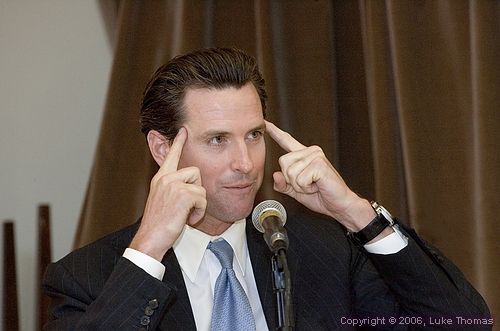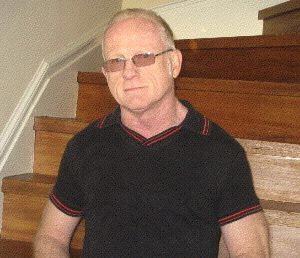The six million dollar mayor:
Why the 2007 mayor's race will be so different
(Part 5 of a 5 part series)

Mayor Gavin Newsom
Photo(s) by
Luke Thomas
By Joe
Lynn
February 23, 2007
Editor's Note: Part 5 of a 5 part series by
elections and ethics expert Joe Lynn. Lynn explains that scandals
aren't all that will reduce Mayor Gavin Newsom's campaign fundraising
Well-heeled interests still spend campaign money in San Francisco
with no effective check from the Ethics Commission. However, the
public now has an unfettered opportunity to demonstrate - again
- its distaste for big money in politics.
My analysis suggests that the mayor, due to new laws and fallouts
from the scandal, will not be able to raise as much money as he
did in 2003, but there are still entities willing and able to
spend on independent expenditures as well as on pet ballot measures
such as Care Not Cash and Aggressive Panhandling.
Fortunately, San Franciscans have a history of tightening limits
on these abuses. Fourteen years ago, San Franciscans approved
the creation of an Ethics Commission to oversee and enforce the
good government laws. In 1995, they enacted voluntary campaign
spending limits. Even Willie Brown in 1999 accepted the expenditure
ceilings.
San Franciscans also elected supervisors who abided by these
ceilings over those who did not. In ten of the eleven supervisor
races in 2000, the candidate with the most money lost; it was
a landmark race for that reason. Voters here undoubtedly seek
a politics cleaner than our Bay.
Yet the implementation and enforcement of voter will has been
left to the City government, primarily the Mayor's office. Tolerance
of the influence of moneyed interests is at an uncomfortable level.
Despite a damning report from the Civil
Grand Jury, the Mayor continues to underfund
the Ethics Commission. This renders it an institution in triage
without the resources to pursue the most troubling violations.
Instead of investigating and prosecuting gross transgressions,
its primary function has been collecting late fines, many of which
come from small campaigns who lack the experience or professional
advice to comply with deadlines. Government institutions alone
cannot ensure that big money is held in check. That's a job left
squarely to the voters.
Now is the time for voters to take an active stand against candidates
backed by unseemly amounts of money. They can voice disapproval
in many ways. They can vote for and donate to candidates backed
by city residents of modest means. A new Public Financing Program
should encourage more such candidates to run; it bolsters their
chances of winning an election. This year, mayoral candidates
can use public financing to boost their treasuries to $1.4 million.
That's about twice as much as was available in 2003 to Matt Gonzalez
for two elections that November and December. It's also about
half of what the Mayor will probably raise this year, effectively
cutting his seven to one fundraising advantage of 2003 to about
two to one - a much more democratic ratio.
I'm not urging voters to abandon Gavin Newsom. Some voters will
find other issues more compelling. However, they don't need to
give money to candidates who are not abiding by our expenditure
ceilings. Voters can properly encourage their clubs to endorse
the Mayor but vote against the clubs' spending any money on him.
His name need not appear on their mailings, leaving his treasury
and volunteers with the responsibility of circulating the club's
endorsement. Whatever the desired course of action, it is important
that voters understand that they are the best agents for tempering
the influence of money on elections.
This works, as proven by the gleaming city of Tucson, Arizona.
It gleams because even politicians there who oppose public financing
still adopt the program since the voters
won't tolerate public business done by politicians indebted
to private big money. This indicates a remarkable shift in expectations
about the culture of campaigns. Perhaps it is time to humble ourselves
and appreciate the grandeur of a southwestern town where people
have learned to take back the driver's seat from moneyed interests.
Assistance on this series was provided by Kevin De Liban;
editing by Daniela
Kirshenbaum.
Joe Lynn was the campaign finance and budget officer of
the San Francisco Ethics Commission from 1998 to 2003. From 2003
to 2006, he served as one of the five Ethics Commissioners. The
San Francisco Examiner called him “the backbone of the Ethics
Commission.” While on staff, he received numerous awards
and has been a speaker at many conferences on Good Government.
He maintains an active interest in good government laws. Email
Joe at joelynn114@hotmail.com

####
Editor's Note: Views expressed by columnists
published on FogCityJournal.com are not necessarily the views or beliefs of
Fog City Journal. Fog City Journal supports free speech in all its varied forms
and provides a forum for a complete spectrum of viewpoints.
|